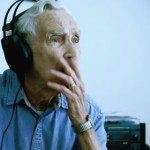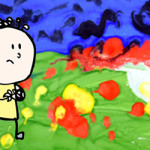
I “found myself” in Erik Davis’s column, “Doom Scroll.”
I have been pulling back on media. No TV news, only reading… and now? Often just reading the headlines. Because the media walks me into a living hell.
Later in the day I participate in conversations that start on a high note only to trail into “informed” doom. But what good are these informed conversations? Talk’s cheap.
I am trying to be a responsible citizen. I just wish the media moguls would join me.
Vicki
Doom Scroll
Erik Davis
As far as I can make out, the term “doomscrolling” started making the rounds in 2019, and became, for obvious reasons, far more infectious in 2020. We’ve had two more years of pandemic, and a yearish of whatever this next thing we are in is, and the term does not seem to be losing much luster. (…)
I suspect you know it well: whether over breakfast or on the metro or during a procrastination break at work, you dip into your newsfeed, which is largely distressing of course, but you keep at it, heading deeper into the gloom. You might start out with some of that old-school newspaper-reader attitude, a mix of curiosity and responsibility and self-concern, under which lies a more basic and unspoken mimetic impulse to keep up with the pressing narratives of a group, a region, a nation, a species. But then the bottom drops out, and the feed starts to feed on you. The number, scale, and wickedness of the problems served up by crisis media—wicked not only in the sense of being nasty and often nefarious, but of being hairy beyond all possible resolve, and therefore ripe for dissension—rears up like, well, a wicked monster, consuming hope, potential, and whatever modicum of feel-good you started your sesh with. (…)
You might have noticed my charged language here—wicked, monster, horrors, nightmare—but all of it pales to the noun honored in the neologism that started us off: doom. Or rather, DOOM. It’s not exactly an everyday word. People sometimes casually drop the adjective—a doomed attempt, doomed from the start—but the noun is much rarer, at least outside of Marvel supervillains, or heavy metal, or old-school first-person shooters—in other words, outside the shadowy margins of genre. But this connection to dark fantasy, horror, and religious myth is, I would argue, absolutely key to the stickiness of the doomscrolling tag and, more importantly, to our susceptibility to the practice it names.
Compulsion is key to doomscrolling, which means that, whatever else is going on, we enjoy it. I suspect everyone has their own twist on this enjoyment, which has less to do with simple pleasure than with jouissance, the Lacanian idea of pleasure confused with pain or intensity, memorably defined in Seminar XVII as the tickle that ends “in a blaze of petrol.” What I want to do here is to approach that pleasure through the lens of genre and narrative. In this sense, doomscrolling—in contrast to “getting depressed by the news”—names a mythic or phantasmic supplement to our data-driven distress.
(…)
Doom is spoken, but doom also comes down, a thing of gravity we see heading towards miles away, like the unavoidable death of our sun. So while you could just as easily call doomscrolling something like dreadscrolling, which better describes the actual feeling, doom names three additional features beyond dread: foreknowledge, finality, and inevitability. Whether it be the sentence of a pitiless cosmic barrister or the workings of karma, just deserts are on their way.
Most of us do not believe we are doomed most of the time. Even if we consider the enormity of the problems unfolding across the globe, we often hold to the idea that “we” are at fault, or possibly “they.” This means there is still something we can do about it. Even in the case of climate crisis—where a myriad of ships have long ago set sail, and the chickens coming home to roost are barbed and ferocious—the complex causes and dynamics at play get reduced in our imagination to human responsibility, and particularly to behaviors that can still be changed. Even if we blame corporations or globalist cabals, powers far beyond our meager levers, we still do not let humans off the hook. Choices and actions are still on the table.
In this situation, doomscrolling becomes a kind of edge-play with agency itself, both personal and collective. By feasting on more and more terrible news, we unravel whatever threadbare hopes remain, tipping ourselves into the ever-present abyss of hopelessness and fatalistic despair. But here’s the secret: because so many of us feel guilty, painfully aware of our complicity in the trainwreck, doomscrolling’s descent into abject surrender offers its own hidden relief. We may remain fascinated with the intricacies of the car crash, but there is really nothing we can do about it. In our darker (or more realistic) hours, we may reason our way to such hopelessness—pessimism of the intellect, and all that—but the emotional submission is where the real frisson lies, the horror and, to be frank, the temporary release, or the sadomasochistic fantasy of release.
But who is the top in this scenario? Within the fantasy that drives doomscrolling, we may imagine that we are finally submitting to Reality, to the hard fact of a world collapsing like dominoes. But we are really bending down before our feeds. In this game, media is the Master.
On one level this is just stating the obvious. We all know that, left or right, “the media” gain from our dread and anxiety, that fear sells, that YouTube algos suck us into feverish extremes, that infinite scroll opens up what Hegel called “bad infinity.” But there is something deeper afoot, something about the mediation offered by narrative itself, or, more accurately, the intensification of narrative affect, the tendency of our storytelling to drift toward sensation.
As I rabbit-holed into doomscrolling, I stumbled upon a 2018 Futurity.org piece about a study in Risk Analysis that analyzed “the impact of dread on the social amplification of threat.” The study tracked the evolution of negative news stories as they passed through a chain of social media participants who did not have access to the original report. Over and over, this online game of telephone intensified the threat and thickened the telling with panic. Moreover, in the face of this “contagion of fear,” the re-injection of the original, less extreme data had virtually no effect on reducing people’s anxiety.
As I wrote above, we ramp stuff up because on some level we enjoy this shit. (…) But now the possibility of all these feelies is stitched into the Real.
In that sense, doomscrolling is a way of “weirding” crisis media in order to secretly, unconsciously transform it into a subgenre of horror — a subgenre whose emotional effectiveness requires that we disavow the fantasies that partly drive it, a disavowal we effect by insisting on the reality of the data and the rationality of the fear and hopelessness it engenders. “I’m not indulging in fear, I am facing reality.”
(…)
Let me be clear: I am not saying that our narratives of existential threat, or social media signs of social collapse, are simply fictions. That would be stupid and insane. When we doomscroll, most of us (at least among the “us” likely to read this) are still participating in the lingering Enlightenment commitment to argument, evidence, clarity, and can-do agency, the rickety matrix that undergirds public discourse and the whole idea of “news”.
(…)
Do not mistake any of this as a counsel of despair. Doomscrolling is a reminder, again to allude to my first book, that our everyday factual lives are woven into an uncanny and psychopathological tapestry of myth, narrative magic, and the mysticism of ultimate things—ultimate ends, ultimate voids, death writ large. But it’s also true that the emotional poverty and insufficiency of social media and newsfeeds is revealed with stark abyssal clarity, and so equally clarifies the need to turn around and claw our way back to the world, to some sense of duration and depth. Reason and investigation are part of that process, but so too is a wiser engagement with our shadow selves. And one way to do that is to recognize and take responsibility for the stories and “affective intensities” swallowing us up.
What fiction is riding you? In Jung’s terms, those spelunking the deep self need to be wary of being “captured by the archetype,” a capture that is signaled everywhere these days by the “passionate intensity” evidenced in so many mediated voices, an intensity William Butler Yeats pegged a century ago in “The Second Coming” as a particularly terrible temptation in apocalyptic times. (…) (N)ot being captured means owning up to the presence of these forces: bringing them to consciousness, comprehending their character, and forming sometimes wary alliances with them.
(…)
The film critic Robin Wood defined the basic horror plot as “normality is threatened by the monster.” Well the monster is here, oh you pretty things, and it looks as though it’s here to stay. Might as well make room for the holy peculiar.






























